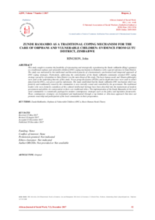This study sought to examine the feasibility of rejuvenating and strategically repositioning the Zunde raMambo (King’s granary) as a traditional orphans and vulnerable children (OVC) coping mechanism in Zimbabwe with a special reference to Gutu District. According to the paper, Zunde raMambo is a Shona method of growing and storing grain for use during the time when food supplies are either high or low. It is an informal, according to the contemporary government laws, in-built social, economic and political mechanism. The Zunde raMambo was largely intended to cater for the disadvantaged people in the community; namely those with disabilities, poor people, strangers, widows and OVC.
Focus group discussions (FGDs) and in-depth interviews were used to collect data from the OVCs, care-givers and key informants. The study established that the Zunde raMambo OVC mechanism which was formerly and traditionally owned by the communities is now centrally owned and controlled by the government. The traditional leaders who were formerly custodians of this cultural intellectual heritage have been absorbed into the mainstream of modern government and politics in contravention to their core traditional ethics. The implementation of the Zunde Ramambo in the local rural communities is cosmetically packaged in modern contemporary strategies such as the policy and legislative frameworks. These contemporary strategies are formulated and implemented through a top-bottom or elite-mass approach that does not promote ownership and participation of the local communities in their programmes.

